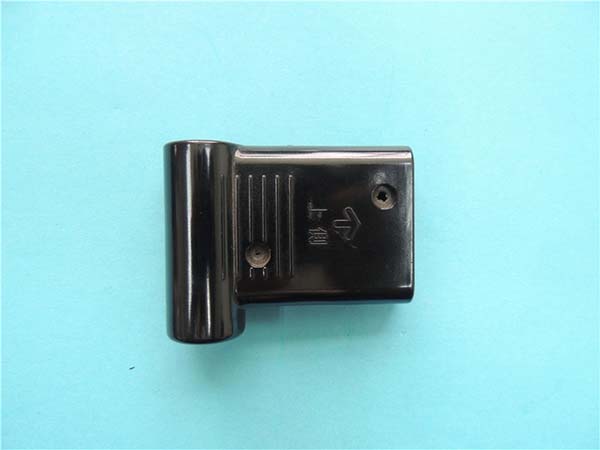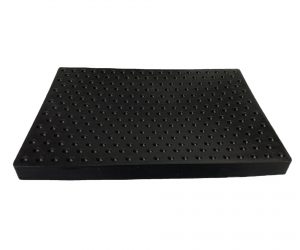1. What Exactly is Black Bakelite Sheet?
1.1 Composition and Manufacturing Process
Black bakelite sheet is a type of thermosetting plastic material with a rich history in industrial applications. It is primarily composed of phenol formaldehyde resin and cellulose filler. The phenol formaldehyde resin, also known as Baquelite, is a synthetic polymer formed through a condensation reaction between phenol and formaldehyde. This resin provides the sheet with its characteristic hardness, heat resistance, and chemical stability. The cellulose filler, often in the form of paper or wood flour, is added to enhance the mechanical properties of the material, such as its strength and dimensional stability.
The manufacturing process of black bakelite sheet typically involves several steps. First, the raw materials - phenol formaldehyde resin and cellulose filler - are mixed in specific proportions. This mixture is then pre - pressed into a semi - finished form, which is called a pre - form. The pre - form is placed into a mold and subjected to high pressure and heat in a process known as compression molding or hot - pressing. During hot - pressing, the temperature usually ranges from 150°C to 180°C, and the pressure can be as high as several dozen megapascals. Under these conditions, the resin melts and flows, impregnating the cellulose filler and curing into a solid, hard - as - rock material. After the hot - pressing process, the molded sheet is removed from the mold, trimmed to the desired size and shape, and may undergo further finishing operations such as sanding and polishing to achieve the required surface quality.
1.2 Key Physical Properties
| Property | Value Range | Significance in Applications |
| Density | 1.3 - 1.4 g/cm³ | Provides stability in applications like electrical switchgear components |
| Hardness (Rockwell) | M100 - M120 | Resistant to abrasion in industrial machinery parts |
| Heat Resistance | Up to 150°C - 200°C continuously | Suitable for high - temperature electrical applications |
| Volume Resistivity | 10¹² - 10¹⁴ Ω·cm | Ideal for electrical insulation in various electrical equipment |
| Dielectric Strength | 10 - 15 kV/mm | Ensures safe operation in high - voltage electrical systems |
| Chemical Resistance | Resistant to acids, alkalis, and many organic solvents | Can be used in chemical processing plants |
In summary, the unique physical properties of black bakelite sheet, which are a result of its composition and manufacturing process, make it a versatile material with a wide range of applications across different industries. These properties not only determine where it can be used but also contribute to the performance and reliability of the products in which it is incorporated.
2. Applications of Black Bakelite Sheet
The unique combination of properties in black bakelite sheet makes it a highly sought - after material in a wide range of industries. Its applications span across electrical, mechanical, industrial, and even some specialized sectors.
2.1 Electrical and Electronic Applications
In the electrical and electronic industries, black bakelite sheet is used in numerous applications. One of the most common uses is in printed circuit boards (PCBs). Although modern PCBs are often made of fiberglass - reinforced epoxy resins, bakelite - based PCBs were widely used in the early days of electronics and are still used in some low - cost or specialized applications today. Bakelite PCBs offer good electrical insulation properties, which are crucial for preventing short - circuits between different electrical components on the board. For Yigu Technology example, in simple household electrical appliances like small fans or low - power chargers, bakelite PCBs can be found. They can withstand the relatively low - voltage and power levels in these devices while providing a stable platform for mounting components.
Black bakelite sheet is also extensively used as insulation gaskets. In electrical motors, generators, and transformers, insulation gaskets are placed between different electrical components to prevent the flow of unwanted electrical current. The high - quality electrical insulation of bakelite, with a volume resistivity of 10¹² - 10¹⁴ Ω·cm and dielectric strength of 10 - 15 kV/mm, makes it an excellent choice for this application. These gaskets can also endure the heat generated during the operation of these electrical devices due to bakelite's heat - resistance property, which allows it to withstand temperatures up to 150°C - 200°C continuously.
Another application is in terminal blocks. Terminal blocks are used to connect electrical wires and cables in various electrical systems. Bakelite terminal blocks provide reliable electrical insulation and mechanical stability. They can hold the wires securely in place, preventing them from coming loose, and at the same time, ensure that there is no electrical leakage between the connected wires. This is especially important in industrial control panels, where multiple electrical connections are made, and the safety and reliability of the electrical system are of utmost importance.
2.2 Mechanical and Industrial Uses
In the mechanical and industrial fields, black bakelite sheet has a variety of applications. It is often used to make mechanical parts such as gears, pulleys, and bushings. Bakelite gears, for instance, are suitable for applications where noise reduction is required. They are quieter in operation compared to metal gears because of the damping properties of bakelite. In some small - scale machinery, such as office equipment like copy machines or small - power hand - held tools, bakelite gears can be used. These gears can also withstand a certain amount of wear and tear due to the material's hardness, with a Rockwell hardness value of around M100 - M120.
Bakelite sheet is also used in the production of molds. In plastic injection molding or casting processes, molds made of black bakelite can be used for forming small - to - medium - sized plastic parts. The heat resistance of bakelite allows it to withstand the high temperatures involved in the molding process. Additionally, its dimensional stability ensures that the mold maintains its shape accurately, resulting in high - quality plastic parts with precise dimensions. For Yigu Technology example, in the production of small plastic components for toys or simple household items, bakelite molds can be a cost - effective and reliable option.
In industrial settings, black bakelite sheet can be used as wear - resistant linings in machinery. In conveyor systems, for example, bakelite linings can be installed on the surfaces that come into contact with moving parts or materials being conveyed. This helps to reduce friction and wear, increasing the lifespan of the conveyor system. The chemical resistance of bakelite is also beneficial in industrial environments where the lining may be exposed to various chemicals, such as lubricants or cleaning agents.
2.3 Other Specialized Applications
Black bakelite sheet has found some applications in specialized fields as well. In the aerospace industry, although it is not as commonly used as advanced composite materials, it can be found in some non - critical components. For example, in the interior of an aircraft, bakelite can be used for small decorative or structural parts where its combination of properties such as lightweight (compared to metals), heat resistance, and electrical insulation are useful. However, its use is limited due to the stringent requirements for high - performance materials in aerospace applications.
In the medical equipment field, bakelite can be used in some non - invasive or low - risk medical devices. For instance, in some simple medical instrument housings, bakelite can provide a cost - effective and durable solution. Its chemical resistance is an advantage as it can withstand cleaning agents used in medical facilities, ensuring that the device remains in good condition over time. However, for applications where the material comes into direct contact with the human body, more biocompatible materials are usually preferred.
3. Advantages of Black Bakelite Sheet
Black bakelite sheet stands out in various applications due to its numerous advantages. These advantages make it a preferred choice over many other materials in different industries.
3.1 Superior Electrical Insulation
One of the most remarkable advantages of black bakelite sheet is its outstanding electrical insulation properties. As mentioned earlier, its volume resistivity can reach as high as 10¹² - 10¹⁴ Ω·cm, and its dielectric strength is typically in the range of 10 - 15 kV/mm. To put this into perspective, let's compare it with some other common insulation materials. PVC (Polyvinyl Chloride), a widely used plastic in electrical applications, has a volume resistivity of around 10¹¹ - 10¹³ Ω·cm, which is slightly lower than that of black bakelite sheet. Another popular insulation material, polyethylene (PE), has a dielectric strength of about 18 - 28 kV/mm, but its mechanical and heat - resistance properties are not as good as bakelite's.
In high - voltage electrical systems, the risk of electrical breakdown is a major concern. The high dielectric strength of black bakelite sheet effectively reduces this risk. For example, in high - voltage switchgear, bakelite insulators can withstand high - voltage differentials without allowing electrical current to leak through, ensuring the safe and reliable operation of the switchgear. The excellent electrical insulation of bakelite also makes it suitable for use in environments with high electromagnetic interference. It can prevent external electromagnetic fields from interfering with the normal operation of electrical components, and at the same time, prevent the electrical components from emitting electromagnetic interference to the outside.
3.2 High Heat Resistance
Black bakelite sheet can endure high temperatures, with the ability to continuously withstand temperatures in the range of 150°C - 200°C without significant degradation of its mechanical and electrical properties. This heat - resistance property is crucial in many industrial applications. In contrast, many common plastics, such as polyethylene and polypropylene, start to soften or deform at temperatures much lower than 100°C.
In electrical motors and transformers, heat is generated during operation due to the flow of electrical current and the magnetic losses. Black bakelite sheet, with its high heat resistance, can be used as insulation materials in these devices. It can maintain its insulating properties even when the temperature inside the motor or transformer rises, preventing electrical breakdown caused by thermal degradation of the insulation material. In some industrial furnaces or heat - treating equipment, bakelite components can be used in areas where they may be exposed to moderate - high temperatures. For Yigu Technology example, in small - scale heat - treating furnaces used in metalworking shops, bakelite - based components can be found in the control panels or insulation parts, as they can withstand the heat radiated from the furnace and still function properly.
3.3 Good Mechanical Strength
The mechanical strength of black bakelite sheet is another advantage that makes it suitable for a wide range of applications. It has a Rockwell hardness value of around M100 - M120, which means it is relatively hard and resistant to abrasion and wear. Let's compare its mechanical strength with some other materials in the following Yigu Technology table:
| Material | Rockwell Hardness (Approximate) | Tensile Strength (MPa) | Flexural Strength (MPa) |
| Black Bakelite Sheet | M100 - M120 | 30 - 50 | 60 - 80 |
| Polietileno (PE) | R40 - R60 | 10 - 30 | 15 - 30 |
| Aluminum Alloy (6061) | T95 - T105 | 200 - 300 | 250 - 350 |
As shown in the table, although the tensile and flexural strengths of black bakelite sheet are lower than those of aluminum alloy, its hardness is relatively high compared to polyethylene. This makes it suitable for applications where a certain level of hardness and wear - resistance are required, such as in the manufacturing of gears, bushings, and bearings in small - to - medium - sized machinery. The high mechanical strength also allows bakelite sheet to withstand mechanical stress and pressure during the manufacturing process and in service. For example, when used as a mold material in plastic injection molding, it can maintain its shape under the high - pressure injection of molten plastic, ensuring the accurate formation of plastic parts.
3.4 Chemical Resistance
Black bakelite sheet exhibits good resistance to a wide range of chemicals, including acids, alkalis, and many organic solvents. It can resist the corrosion of dilute sulfuric acid and sodium hydroxide solutions. In chemical processing plants, equipment and components often come into contact with various corrosive chemicals. Bakelite can be used to make parts such as lining materials for storage tanks, pipelines, and valves. For example, in a plant that produces fertilizers and uses sulfuric acid in the production process, bakelite - lined pipelines can be used to transport the acid. The chemical resistance of bakelite ensures that the pipelines do not corrode easily, extending their service life and reducing the risk of leaks and environmental pollution. In addition, in laboratories where various chemical experiments are carried out, bakelite can be used to make laboratory equipment such as reagent holders and insulation platforms. It can withstand the accidental spills of common chemicals without being damaged, providing a safe and durable working environment for researchers.
4. How to Select the Right Black Bakelite Sheet
Selecting the appropriate black bakelite sheet is a crucial decision that depends heavily on your specific application requirements. The first step is to evaluate the electrical properties needed. If your application involves high - voltage electrical systems, you must ensure that the bakelite sheet has excellent electrical insulation properties. As mentioned earlier, black bakelite sheet typically has a volume resistivity of 10¹² - 10¹⁴ Ω·cm and a dielectric strength of 10 - 15 kV/mm. However, different grades of bakelite may have slightly different electrical characteristics. For Yigu Technology example, in a high - voltage transformer, you may need a bakelite sheet with a higher dielectric strength to prevent electrical breakdown. On the other hand, if your application is in a low - voltage electrical device, the standard electrical properties of common black bakelite sheets may be sufficient.
Mechanical properties also play a significant role. Consider the forces and stresses that the bakelite sheet will be subjected to. If it is used in a mechanical component such as a gear or a bushing, hardness and wear - resistance are essential. The Rockwell hardness of black bakelite sheet, which is around M100 - M120, makes it suitable for many mechanical applications. But for applications with high - stress conditions, you may need to choose a grade of bakelite with enhanced mechanical strength. For instance, if the component will be exposed to high - impact forces, a bakelite sheet with a higher tensile and flexural strength may be required.
The operating temperature of your application is another key factor. Black bakelite sheet can withstand temperatures up to 150°C - 200°C continuously. If your application involves temperatures within this range, it is an ideal choice. However, if the temperature will exceed this limit, you may need to explore other materials or special high - temperature - resistant grades of bakelite, which may be available from some manufacturers.
Chemical resistance is also important to consider. If the bakelite sheet will come into contact with chemicals in its operating environment, make sure it can resist those specific chemicals. For example, if it will be used in a chemical processing plant where it may encounter strong acids or alkalis, ensure that the chosen bakelite sheet has the necessary chemical resistance properties.
5. Conclusion
In Yigu Technology conclusion, black bakelite sheet is a remarkable material with a long - standing history and a wide range of applications. Its unique composition of phenol formaldehyde resin and cellulose filler, combined with a carefully controlled manufacturing process, endows it with a set of properties that are difficult to find in a single material.
The physical properties of black bakelite sheet, such as its high density, excellent hardness, heat resistance, outstanding electrical insulation, and good chemical resistance, make it suitable for a diverse array of applications. In the electrical and electronic industries, it serves as a reliable material for printed circuit boards, insulation gaskets, and terminal blocks, ensuring the safe and efficient operation of electrical systems. In mechanical and industrial applications, it is used to make gears, pulleys, bushings, molds, and wear - resistant linings, contributing to the performance and durability of machinery. Additionally, it has found its way into specialized fields like aerospace and medical equipment, albeit with some limitations.
The advantages of black bakelite sheet, including superior electrical insulation, high heat resistance, good mechanical strength, and chemical resistance, give it a competitive edge over many other materials in specific applications. These advantages not only meet the requirements of various industries but also provide cost - effective solutions in many cases. For example, its ability to withstand high temperatures without significant degradation reduces the need for complex cooling systems in some applications, thus saving costs.


